Vaccinium facts for kids
Quick facts for kids Vaccinium |
|
|---|---|
 |
|
| Vaccinium berries, from top left clockwise: Red huckleberry, cranberry, lingonberry and blueberry |
|
| Scientific classification | |
| Kingdom: | |
| Division: | |
| Class: | |
| Order: | |
| Family: | |
| Subfamily: |
Vaccinioideae
|
| Tribe: |
Vaccinieae
|
| Genus: |
Vaccinium
|
Vaccinium is a group of flowering plants that are mostly shrubs. They belong to the plant family called Ericaceae. Many delicious fruits come from Vaccinium species. These include popular berries like blueberries, cranberries, huckleberries, and bilberries.
There are about 450 different types, or species, of Vaccinium plants. Most of them grow in cooler parts of the Northern Hemisphere. You can also find a few tropical types in places like Madagascar or Hawaii. These plants often grow in open areas called heathlands or in forests. Like many plants in their family, most Vaccinium species prefer to grow in acidic soils.
Many insect larvae, like those of moths and butterflies, eat these plants.
What Scientists Are Learning
Scientists are always studying plants to understand them better. The way Vaccinium plants are grouped, called their taxonomy, is quite complex. Researchers use genetic analysis to learn more about how these plants are related.
Sometimes, scientists find that a group of plants might need to be changed. This could mean adding more related plants to the Vaccinium group. Or, it might mean splitting Vaccinium into several smaller groups. This helps scientists understand the plant family tree more clearly.
Images for kids
-
Vaccinium oxycoccos, the common cranberry.
See also
 In Spanish: Vaccinium para niños
In Spanish: Vaccinium para niños
 | May Edward Chinn |
 | Rebecca Cole |
 | Alexa Canady |
 | Dorothy Lavinia Brown |



